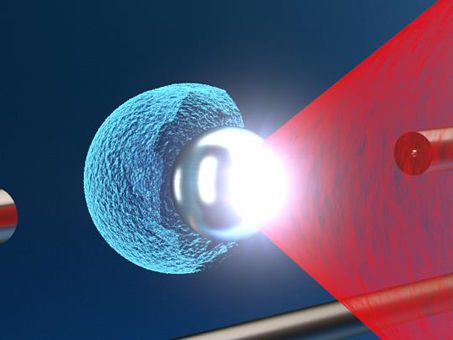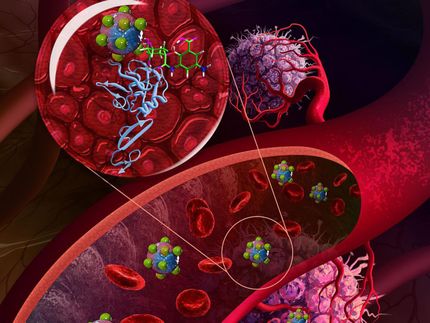From nanobeads to proton radiation
Advertisement
light, when strongly concentrated, is enormously powerful. Now, a team of physicists led by Professor Jörg Schreiber from the Institute of Experimental Physics – Medical Physics, which is part of the Munich-Centre for Advanced Photonics (MAP), a Cluster of Excellence at LMU Munich, has used this energy source with explosive effect. The researchers focus high-power laser light onto beads of plastic just a few micrometers in size. The concentrated energy blows the nanoparticles apart, releasing radiation made up of positively charged atoms (protons). Such proton beams could be used in future for treating tumors, and in advanced imaging techniques.

The Texas Petawatt laser pulse (red) is focused onto a levitating microsphere target. The immense laser-intensity causes the fierce explosion of the microsphere, thereby generating potentially useful energetic ions from an ultra-small source (blue).
Tobias Ostermayr
At Texas Petawatt Lasers in Austin, Texas, the LMU physicists concentrated laser light so strongly on plastic nanobeads that these essentially exploded. In the experiment, approximately one quadrillion billion photons (3 times 1020 photons) were focused onto microspheres of about 500 nanometers in diameter. Each bead consists of about 50 billion carbon and hydrogen atoms and is held in suspension by the electromagnetic fields of a so-called “Paul trap”, where the laser beam can irradiate them.
The laser radiation rips away some 15 per cent of the electrons bound in these atoms. The remaining, positively charged atomic nuclei are then violently repelled, and the nanospheres explode at speeds of around 10 per cent the speed of light. The radiation from the positively charged particles (protons) then spreads out in all directions.
This mode of production of proton beams with laser light promises to open up new opportunities for nuclear medicine – for example, in the fight against tumors. At present, proton beams are produced in conventional accelerators. In contrast, laser-generated proton beams open the door to the development of novel, perhaps even cheaper and more efficient, methods of treatment. The Munich-based team led by Jörg Schreiber has hitherto produced proton radiation using a diamond-like film, which is targeted by extremely strong laser light. The proton radiation thus emitted could then be directed onto the body of a patient.
The ability to produce radiation by the explosive disintegration of plastic nanobeads might even allow the nanoparticles to be placed inside a tumor, and be vaporized with laser light. Thus proton beams could be put to work in destroying tumors without causing damage to surrounding healthy tissue.




















































